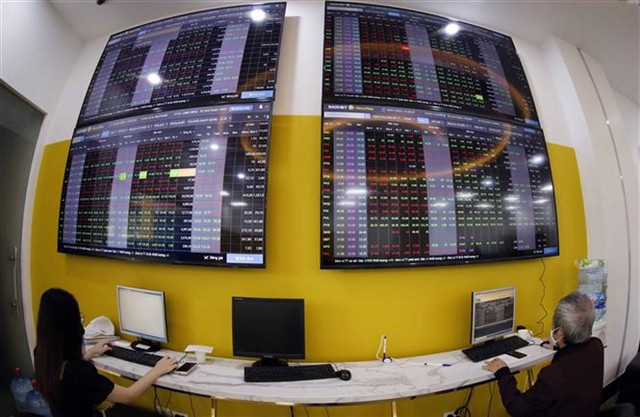 |
| Investors at Bảo Việt Securities. The diversification of listed stocks will help attract foreign capital into Việt Nam's securities market. — VNA/VNS Photo Trần Việt |
The lack of initial public offerings (IPOs) from new market entrants makes it difficult for the securities market of Việt Nam, which is dominated by banking stocks, to attract foreign capital.
The IPO market in Việt Nam had been frozen during the past four years after the robust period of 2017-19, which saw IPOs of big names such as Petrolimex (PLX), Vinhomes (VHM), Vincom Retail (VRE), Techcombank (TCB), VPBank (VPB), Bình Sơn Refining and Petrochemical Joint Stock Company (BSR) and PV Power (POW).
A report by Deloitte Việt Nam earlier this year showed that there were only eight successful IPOs in Việt Nam in 2022 which raised a total of US$71 billion, compared to 42 IPOs in Thailand which raised $3.6 billion and 59 in Indonesia with $2.3 billion raised.
Since the COVID-19 pandemic, there were new options coming from the switching of listings to HCM City Stock Exchange (HOSE) such as Đức Giang Chemicals (DGC), Việt Nam Rubber Corporation (GVR), Becamex (IJC), Viettel Construction (CTR). However, the stocks with low liquidity of free-float were not tastes of foreign investors.
Different from the robust period in 2018, the recent IPOs were not attractive to cash inflow with many stocks tumbling significantly after IPOs.
One of the reasons for the frozen IPO market was the stagnant equitisation of several State-owned enterprises (SOEs) including Agribank, VNPT, MobiFone, Vinataba, Vinachem and HUD which still had no specific date for completion.
The problems in asset valuation caused the IPO of SOEs to be stuck, creating a bottleneck in attracting foreign indirect investment (FII) flows in Việt Nam, Nguyễn Duy Linh, general director of VPBank Securities said.
With estimates that the US Federal Reserve was likely to make significant rate cuts next year, beginning earlier than previously forecasted, together with the recovery of emerging economies, the FII would be more selective towards markets with stories for investment. Việt Nam would be a destination, Linh said.
“The upgradation of the market status plays an important role,” Linh said, adding that the Government should strengthen IPOs, capital divestment at SOEs as well as upgrading the stock market status in 2024-25 to attract FII.
He said that FII inflow depended on the quality of economic growth, stocks, the market transparency and enterprises themselves meeting criteria for investment. “There are opportunities even in the most difficult time,” Linh said.
According to Chairman of Dragon Capital Việt Nam Dominic Scriven, the stock market should not rely too much on the IPOs of SOEs alone. He said the solution should be promoting the listings of private enterprises. “The diversity of stocks will help attract foreign capital,” he said.
The lack of diversity of stocks made it difficult for investors and funds to develop their portfolios because currently banking and real estate stocks account for the majority of the Việt Nam’s stock market.
For example, Pyn Elite Fund spent more than half of their net asset value, estimated at around $800 million, in banking stocks. The $1.6 billion VEIL under Dragon Capital also held 60 per cent of their net asset value in banking and real estate stocks.
Banking stocks were too dominant. Statistics shows that banks account for nearly 40 per cent of the capitalisation on HCM City Stock Exchange, in which Vietcombank (VCB) and BIDV (BID) alone make up for 15 per cent. There are 14 banking stocks in the VN30 basket. Sixteen out of 41 companies with a market capitalisation from $1 billion were banks.
New market entrants would be important if Việt Nam wanted to take advantage of the foreign cash inflow when the market status was updated, he said.
“When the bottlenecks in the IPOs of SOEs cannot be solved immediately, the expectation should be on the private sector,” he said.
Many private companies planned to IPO worth billions of US dollar in the last two years, including Hưng Thịnh Land, CP Việt Nam, VSIP, Giao Hàng Tiết Kiệm, Bách Hoá Xanh and Thaco.
Việt Nam is currently classified as a “frontier market” by global ratings organisations FTSE Russell and MSCI.
FTSE Russell’s September 2023 ranking report placed Việt Nam on a watch list for possible reclassification to secondary emerging market status. — VNS